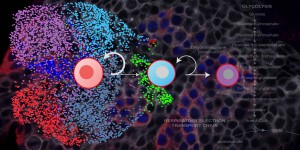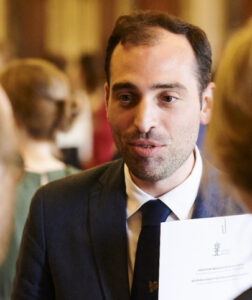In a recent work published in eLife, Cédric Maurange’s team identifies a genetic program that organizes the metabolic heterogeneity of cells in a pediatric neural tumor model.
 Brain cancers account for about 25% of all cancers in children, but less than 2% in adults, suggesting that the developing brain is particularly prone to cancer transformation. However, the underlying reasons are not yet clearly identified. By combining advanced Drosophila genetics, numerical modelling and single cell sequencing, Sara Genovese, Raphaël Clément and Cassandra Gaultier discovered that temporal patterning program normally deployed in Drosophila neural stem cells during development is partially recapitulated in a pediatric neural cancer model. The redeployment of this genetic program creates metabolic and proliferative heterogeneity between tumor cells and a finely controlled hierarchical organization. This work highlights the gene network that, when diverted, initiates and regulates tumor growth in the developing brain.
Brain cancers account for about 25% of all cancers in children, but less than 2% in adults, suggesting that the developing brain is particularly prone to cancer transformation. However, the underlying reasons are not yet clearly identified. By combining advanced Drosophila genetics, numerical modelling and single cell sequencing, Sara Genovese, Raphaël Clément and Cassandra Gaultier discovered that temporal patterning program normally deployed in Drosophila neural stem cells during development is partially recapitulated in a pediatric neural cancer model. The redeployment of this genetic program creates metabolic and proliferative heterogeneity between tumor cells and a finely controlled hierarchical organization. This work highlights the gene network that, when diverted, initiates and regulates tumor growth in the developing brain.
This work has been supported by the ARC Foundation, the CNRS, the AMU and the Ligue Contre le Cancer.
To know more :
-
Coopted temporal patterning governs cellular hierarchy, heterogeneity and metabolism in Drosophila neuroblast tumors.
Sara Genovese, Raphaël Clément, Cassandra Gaultier, Florence Besse, Karine Narbonne-Reveau, Fabrice Daian, Sophie Foppolo, Nuno Miguel Luis, Cédric Maurange



